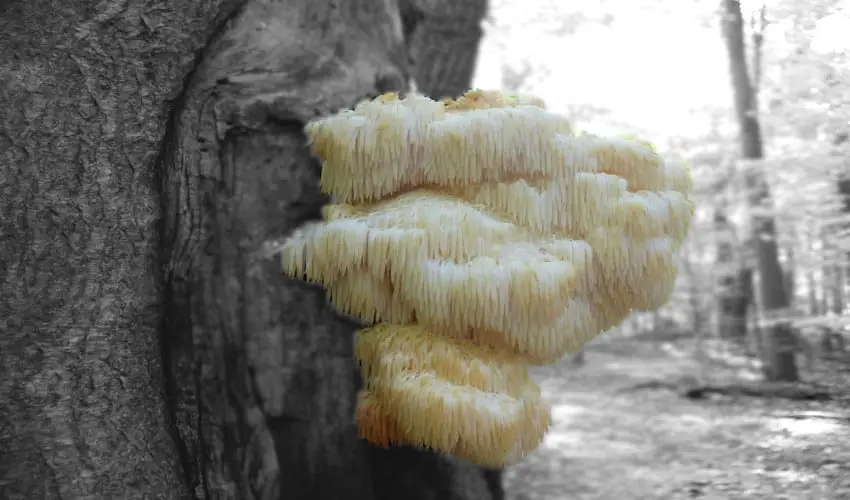Does lions mane get you high?
When it comes to eating mushrooms, the first question everyone asks is “do they make you trip?”
Lion’s Mane mushrooms are non-psychoactive and will NOT get you high or make you trip.
I came across Lions Mane mushrooms after getting Covid, losing my taste, and researching ways to regenerate my nerve cells responsible for taste. I ended up taking Lions Mane for 30 days and doing as much research on lion’s mane as humanly possible.
The lion’s mane mushroom is a fascinating fungus that’s edible, delicious, has a texture that tastes like lobster, and is packed with unique health benefits.
In this article we’ll look at the science, research, expert perspectives, opinions, and my own 30 day journey of taking lions mane every morning.
Let’s Dive In.
What Is The Lions Mane Mushroom?
With the scientific name, “Hericium Erinaceus”, lions mane is an editable mushroom found primarily in the Northern Hemisphere. Lion’s mane only grows on hardwoods (usually dead ones), and gets its common name from its ‘bushy’ lions-mane-looking appearance.

Lions mane may be new to you and me, but in Asia, the lions mane mushroom has been used in Traditional Chinese Medicine (TCM) for centuries.
Known for its brain-health-benefits (among other health benefits), the lions mane mushroom has started becoming popular in the western world, including the US. You can either take lions mane in capsule form, powder form (it’s great in coffee), or you can eat the mushroom either cooked or raw.
From my own personal experience, I found that the texture of the lions mane mushroom to resemble crab meat or lobster meat and I though the taste was really good with any seasoning !
9 Health Benefits Of Lion’s Mane Mushrooms (The Research)
What Does Lion’s Mane Do?

The research on the health benefits associated with lion’s mane is still in its infancy. But as ancient knowledge of both plant-and-mushrooms-based medicines is becoming more mainstream in the Western World, more funding for further human studies will likely spark new research to deepen our collective understanding of the lions mane health benefits.
1. Fights Inflammation And Oxidation –
In 2014 a study published by the National Science Foundation of China found that lion’s mane mushrooms contain both powerful anti-inflammatory and antioxidant compounds.
Medical experts agree that symptoms of chronic inflammation and oxidative stress are early precursors at the “root” of many ‘modern-day’ illnesses like heart disease, cancers, and different autoimmune disorders
In rat studies researchers have found that lion’s mane mushroom extract reduced notable signs of both inflammation and oxidative stress.
According to the medical experts at Healthline,
“Lion’s mane mushroom contains powerful antioxidant and anti-inflammatory compounds that may help reduce the impact of chronic inflammation”.
2. May Alleviate Anxiety And Depression –
Although more large-scale human studies are needed, multiple pre-liminary studies suggest that lion’s mane mushrooms may indeed help alleviate symptoms of both depression and anxiety.

In a 2015 study lead by Dr. Wei Yao, researchers found that lab mice that consumed lion’s mane mushrooms showed less signs of depression-related behavior cues, and also had blood tests which indicated lower levels of depression.
Another study in 2018 published by the International Journal of Molecular Science found that lions mane supplementation “normalized the behavioral alterations triggered by stress.”
The study’s leader, Dr. Chun-Hung Chiu believes the anti-depression effect may come from the restoration of neurotransmitters in the brain.
Dr. Chiu goes so far as to say that Lion’s Mane “may represent a potent alternative therapy for depression.”
3. Improves Cognitive Health –
In my own personal 30 day experiment, the conative effects of the lions mane mushroom were subtle, but noticeable.
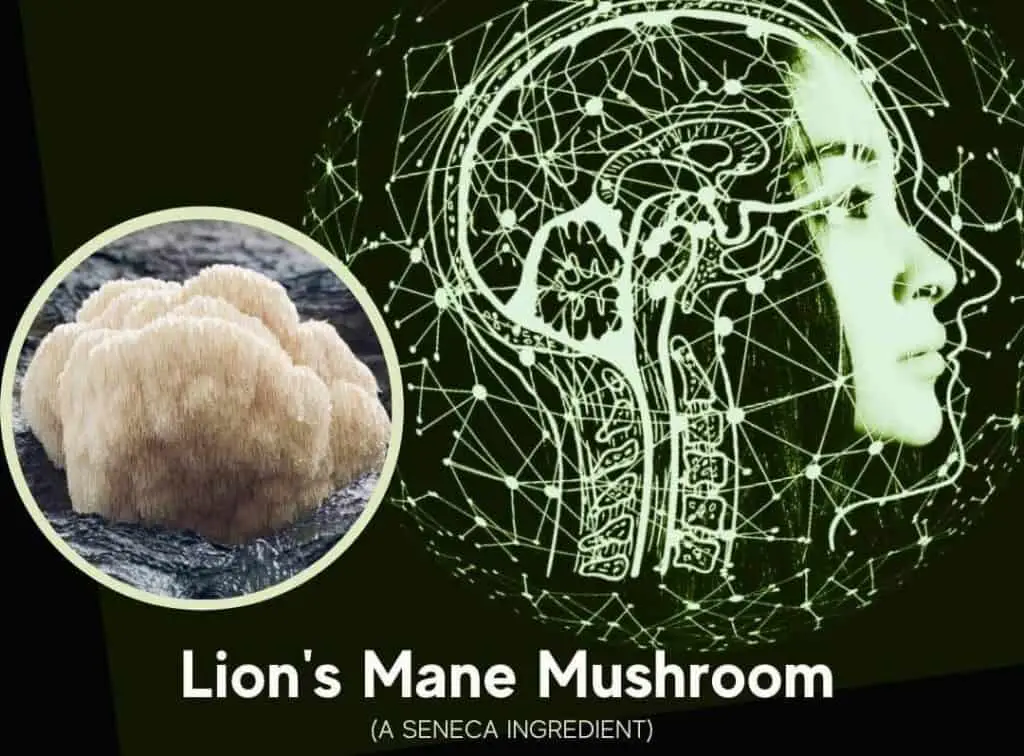
A study lead by Dr. Federico Brandalise in 2017 found that lions mane had an “influential” effect on the cognitive ability of mice.
Dr. Brandalise goes intro great detail, saying that lion’s mane works in the brain by “increasing new glutamatergic-synaptic-drive exploration behavior and recognition memory in the hippocampus.”
In my own less specific terms, “it helps aid brain-neuron connections and helps memory”
Another study lead by Dr.Koichiro Mori in 2008 and published by the National Center For BioTechnology Information, found that Lion’s Mane “Significantly” increased cognitive function.
Dr. Mori set-up a double-blind, placebo-controlled study that showed that those who took lions mane over a 16 week period, increased their cognitive scores in direct proportion the duration of intake of the mushroom powder.
The overall conclusion of the study suggested that lions “is effective in improving mild cognitive impairment.”
4. May Improve Overall Heart Health –
Heart disease is the leading cause of death in the US with almost 700,000 people a year dying from heart disease.
The biggest risk factors for heart disease are
- Obesity
- High Triglycerides
- Large amounts of oxidized cholesterol (Increased tendency to get blood clots)
New research is showing that lion’s mane mushroom extract can influence more than one of these factors and help to reduce the risk of heart disease.
In 2013 Dr. Won-Sik Choi authored a study on Lions Mane mushrooms that was published by the National Library of Medicine.
The study concluded that lion’s mane was able to “demonstrate potent cholesterol-lowering activity” in mice and could therefore lead to the development of therapeutic drugs for controlling high cholesterol in humans.
Lions mane was also found to decrease low-density lipoprotein-cholesterol, triglycerides, and total cholesterol.
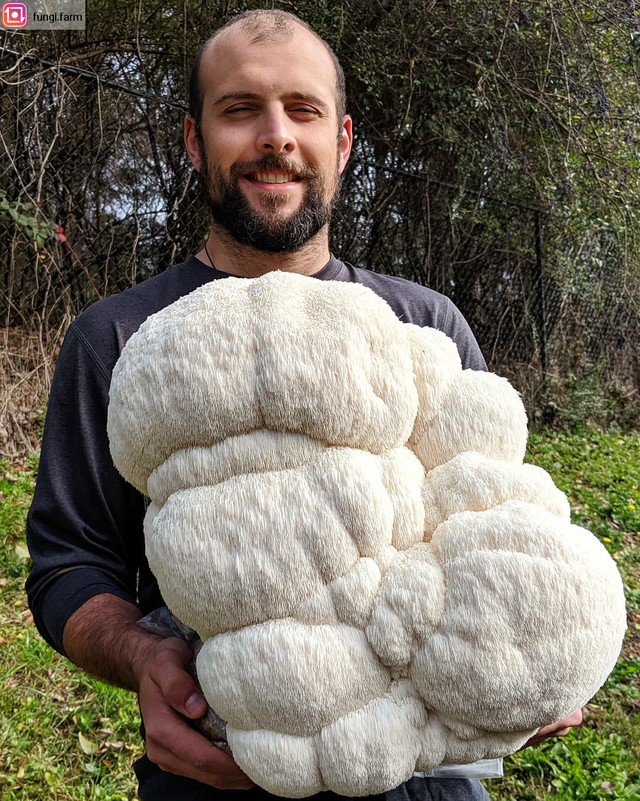
In an older 2010 study published by the Oxford University Press, researchers found that mice who were taking lions mane supplements for 28 days ended up with a “significant decrease in body weight gain, fat weight, and serum and hepatic triacylglycerol levels”
Yet another study lead by Dr. Aziz Rahman in 2014 used test tube analysis to find that “lion’s mane extract can help prevent the oxidation of cholesterol in the bloodstream”
“Oxidized cholesterol” is what happens when cholesterol sticks to the walls of arteries, hardens, reduced blood flow through the arteries, and increases the risk of a heart attack and stroke.
5. Helps Nervous System Recovery –
The thought that lion’s mane may help nervous system recovery is what lead me to discover lion’s mane in the first place.
The International Journal of Medicinal Mushrooms published a fascinating study in 2015
lead by researcher, Dr. Snehlata Samberkar, who analyzed lab samples of neurons that were exposed to lions mane samples.
Dr. Snehlata Samberkar found that the neuron growth activity was confirmed over 20% “in all tissue samples”. Including 20.47% in brain cells, 22.47% in spinal cord cells and 21.70% in retinal cells.
A previous 2011 study lead by Dr. Kah-Hui Wong (from the Institute of Biological Science at the University of Malaya in Malaysia) researched the effects of lions mane on mice with nerve injuries.
Dr. Wong’s team administered at a non-toxic dose of 10 to 20mL / kg body weight per day which they found had “increased the rate of recovery after the peripheral nerve injury”.
He concludes optimistically, hoping that future patients who take lions mane will experience a faster improvement in quality of life and a faster, functional recovery after injury.
Dr. Wong is hopeful that future research models will focus specifically on the root-causes behind the direct-effects lion’s mane has on nerve regeneration.

In 2003 a ‘test tube’ study published by the National Academy of Sciences in Kiev Ukraine found that lions mane extract promoted the growth of nerve cell ‘Myelin sheaths’.
When one nerve cell connects to another it forms a physical bond through an axon. Over time, the axon connection strengthens and supports itself with the growth of protective myelin sheaths. When there’s an injury that impact the myelin sheaths it can lead to nerve injuries.
In 2014 Dr. Kam-Fai Lee lead a group of researchers in a study looking to find solutions to protecting the brain from further damage after a stroke.
The study (which was published by the International Journal of Molecular Sciences) found that lions mane offers “neuroprotective effects after brain injury, has the ability to scavenge free radicals, and inhibits inflammation”.
In a 2016 study published by the International Journal of Molecular Sciences, lead scientist Dr. Junrong Zhang concluded that their findings provide experimental evidence that lions mane “may serve as a neuro-protective candidate for treating or preventing neuro-degenerative diseases.”
6. Dementia –
It’s well known that the brain’s ability to grow and form new connections typically declines with age. Evidence has been clear, that after age 55 many (but not all) brain functions start to decline. It is for this reason that many people are suggesting a maximum age for certain political positions.
None the less, dementia is a devastating disease caused by decreased brain connectivity, for which there is currently no cure.
However, lab studies on lion’s mane mushroom may shine some light on new opportunities. In 2013 a study, conducted by the Mushroom Research Center at the University of Malaysia, found that mushroom extract yielded an increase of 60.6% neurite outgrowth in lab tests. The study has also been published by the National Library of Medicine. Neurites are the “branch” connections from one brain cell to the next.
Lion’s mane has also shown promise in reducing symptoms of memory loss in mice, as well as preventing damage caused in the brain during Alzheimer’s disease. In 2016 a study published by the Journal of Biomedical Science, Dr. Tzeng Tsai-Teng led a team of scientists to experiment with lion’s mane extract to treat Alzheimer’s Disease.
The study’s results suggested that lions mane “reduced cortical and hippocampal amyloid plaque burden in mice”. With these results, the team of researchers lead by Dr. Tzend boldly conclude that liuons mane may indeed have the “therapeutic potential for treating Alzheimers Disease, as well as the other neurodegenerative diseases”.
While no studies have analyzed whether lion’s mane mushroom is beneficial for Alzheimer’s disease in humans, it does appear to boost mental functioning.
I personally can attest to this.
The ability of lion’s mane mushroom to promote nerve growth and protect the brain from Alzheimer’s-related damage may explain some of its beneficial effects on brain health.
How Does Lion’s Mane Mushroom Actually Work?
What is it about lion’s mane that makes it so special? What’s the “”secret sauce””?
The secret lies with in the name of the mushroom itself. The scientific name of lion’s mane, Hericium Erinaceus is named after the two molecules that make up the mushrooms DNA.
Studies have found that the lion’s mane mushrooms contain two very special molecular compounds that stimulate brain cell growth.
1. Hericenone –
“Hericenone” is a chemical molecule which belongs to a much larger group of molecules known as ‘benzaldehydes’. Benzaldehyde molecules are found naturally in different fruit bodies and are also extracted for food flavoring.
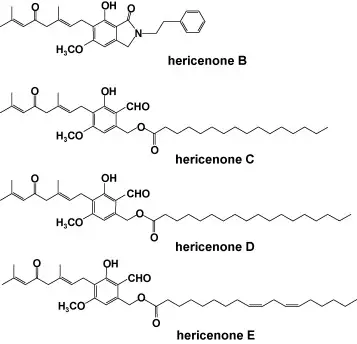
However, the very specific “hericenone” molecular strain acts very differently inside the body than its food flavoring cousin does. It is the hericenone molecule that has been found responsible for promoting nerve growth.
There are a total of 11 different hericenone molecules. Hericenone A, hericenone B, ect up to hericenone K.
2. Erinacines –
Erinacines is another molecular compound which can be isolated from lion’s mane extract. And just like “hericenone” , “erinacines” also has enhancing effects on nerve cell growth.
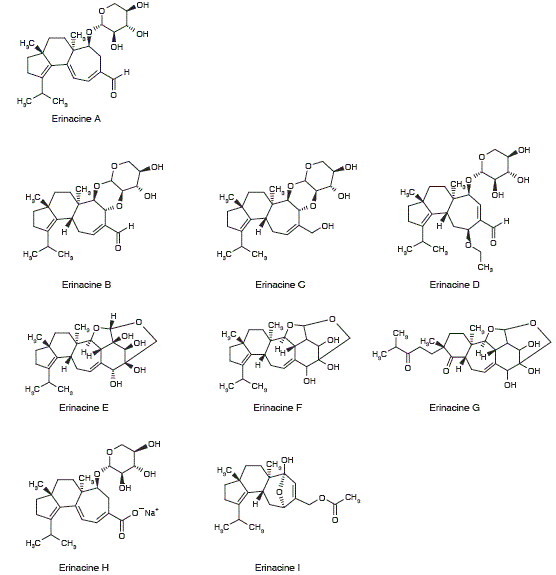
There are many variants of the erinacines molecule, all the way from erinacines A to erinacines Q.
Erinacines E is very specific in that it has the ability to interact directly with “kappa opioid receptors” in the brain.
In 2014 a study lead by Dr. Laurence Lalanne, which was published by the National Library of Medicine, found that Kappa opioid receptors function as a natural addiction control mechanism and “critically controls drug-seeking and relapse”
What Does Taking Lion’s Mane Mushrooms Feel Like?
Here’s What Happened When I Took Lions Mane Every Day For 30 days
I first learned about lion’s mane after I got COVID and lost both my taste and smell. After scouring the internet for more information it seemed like the root cause was the direct harm to the nerve cells responsible for picking up the sensation of taste.
Turns out it can take anywhere from weeks to months for the body to regenerate nerve cell connections. So I started looking for natural products that boost nerve cell growth in an attempt to speed up the process to being able to taste food again with having to use 2 gallons of Franks Hot Sauce.
Lion’s mane to the rescue.
When I found that lion’s mane may help boost nerve cell growth I went to my local mushroom store and bought lions mane ground powder as well as a full raw head of lions mane.
I took 1 scoop (somewhere between a tea-spoon and table-spoon) of powder mixed in with my coffee every morning. I also ate the mushroom itself both raw and cooked experimenting with different recipes.
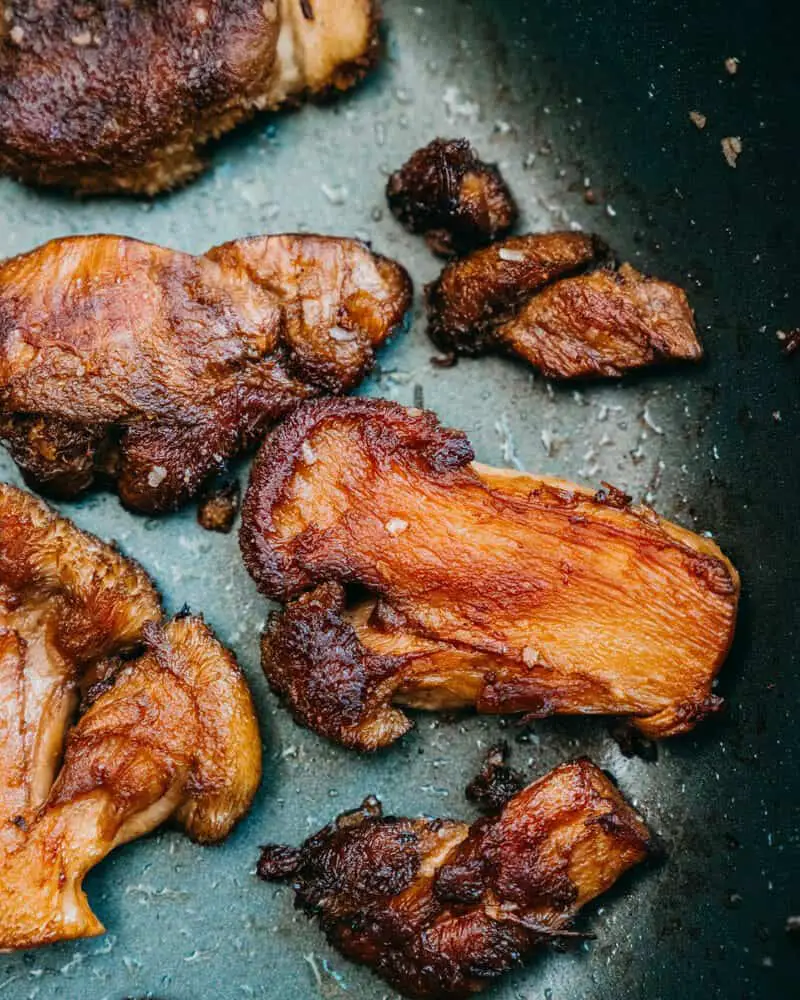
Three weeks later I had regained both my taste and smell, but there were some other effects that were pretty interesting.
Non-of the effects were vibrantly noticeable, but I did find a subtle ability to focus on my work quicker, for longer, and more efficiently. My brain just seemed “on point”. I felt as though I had an edge and my thoughts felt clearer and easier to access.
I’m usually a very methodical thinker, and as a result when I talk I often come across as ‘robotic sounding’. However, during the month I was taking lions mane, I felt as though my communication flowed a little more naturally as words just and thoughts converged together with ease.
For me, it was subtle, but noticeable.
Once my taste came back I finished out the month and then stopped taking the powder for a few weeks.

During that few week break is when the effects really started to kick in. It was only after I stopped taking the lions mane extract that I felt a noticeable drop in my focusing ability. My work efficiency seemed to drop 10-15% and I just felt a little more sluggish.
So, I went down to the local mushroom shop, spoke to the owner and that when I learned about the hericenone and erinacines molecules which are special due to their unique ability to cross the ‘blood-brain’ barrier.
I’ve tried the extract from a few different stores and have been using it in my coffee every morning ever since.
Does Lion’s Mane Have Any Side Effects?
To date, controlled clinical human studies have not examined the side effects of lion’s mane mushrooms, but hundreds of years of use in Traditional Chinese Medicine (TCM) as well as anecdotal evidence finds that lion’s mane appears to be very safe.
However, just like some people are allergic to strawberries, general mushroom allergies are a real thing, so anyone who is allergic or sensitive to other mushrooms should avoid lion’s mane, since it is a species of mushroom.
There have also been multiple animal studies that have suggested lion’s mane mushroom and its extracts are very safe (even at high doses).
Lions Mane Mushroom FAQ:
Are Lions Mane Mushrooms Legal?
Yes. Lion’s Mane is legal in every US state.
Do Lions Mane Mushrooms Cause Intoxication?
No. Lion’s mane are NOT psychedelic, do NOT get you high, and do NOT cause intoxication.
Where Can I Buy Lions Mane Mushrooms?
Lion’s Mane powder can be bought online (Om mushrooms) in health-food stores, food co-ops, or local mushroom shops.
What Do Lions Mane Mushrooms Taste Like?
Taste is subjective, but the mushroom itself is, in my opinion, fairly bland, and takes the taste of whatever it is seasoned with. The mushroom powder has an organic taste similar to other raw mushrooms.
Final Thoughts: Lions Mane Mushrooms
The hard scientific evidence on lion’s mane mushroom in the form of clinical human studies is still in its infancy. However, “test tube” studies, and lab mice study have so far proved promising.
Anecdotal human studies (non-clinical studies) have also been very promising.
My own personal study lead to a recovery of taste in 3 weeks. This is hardly groundbreaking, but certainly a lot better than a lot of other recovery times I’ve heard of.
For me the cognitive benefits were the most impressive. After I stopped taking the extract for 2 weeks, the difference was noticeable enough for me to start back up again. Now lion’s mane has become part of my daily routine.
If you’ve had any similar experiences I’d love to hear about it…Send us an email and let us know or drop a comment below.
Loved what you read?
Hit that share button and let the world in on the secret – we’d be thrilled!
Got thoughts? We’re all ears for your feedback, corrections, or a good old chat. Don’t be shy; drop us a line.
And hey, don’t miss out on our curated list of must-reads in the recommended books section.
Big thanks for diving in with us today!


